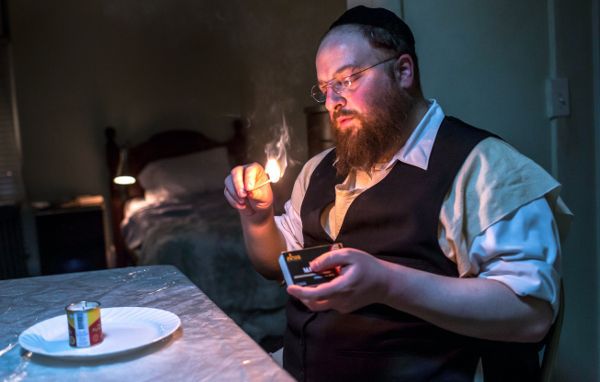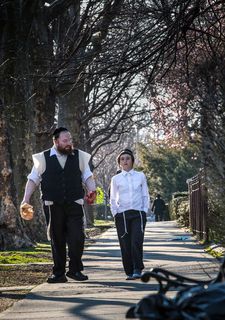When I caught up with Lipschultz at Edinburgh Film Festival this summer we talked about the difficulties of making a film concerning Hadism at all. The community, like many other ultra-orthodox faiths, has very strict rules about not engaging with those outside their belief system, a stance that renders them resistant to documentary.
"It's kind of a miracle that this movie turned out this well, given the sort of slapdash way that we actually made it," he said "We started shooting from treatment and with a lot of improv and, over time, that evolved into something that was being shot from a full script. The reason we were able to do that because rather than shooting the film in a conventional way when you figure out how many days it's going to take to do it and put all the pieces together into a schedule and then you've got 20, 30 40 days for an indie film to shoot it all at once.
"I felt, as a producer that given it was a filmmaker who was just trying out narrative fiction, actors who had never acted before and many of whom had never even seen movies before speaking a language that neither the director nor I spoke, with a fair bit of improvisation to just rush head-long into this whole thing and shoot it in one go, if we'd have encountered any problems with our approach, once that train has left the station there's not stopping it.
"So what we decided to do was shoot the film in a number of week-long chunks over the course of a year. To give ourselves breathing room, room for a margin of error and room not only to learn from our mistakes but to get to know the community better as we really embeded in it. To tweak things from there and reshoot as we went. While on any given day the shoot was structured in a very similar way to any normal narrative shoot, the overall process - the gestalt of it - was more like a doc, in terms of finding the story as you go and editing as you go.
"It was a really wonderful way to make a movie - if I could make every movie that way I would. The script and the story and the beats and the themes really evolved as we went and there were some nice surprises along the way. But it was a controlled evolution on our part rather than particularly improv-driven."
He says the idea for the film itself began with Crown Heights-based Weinstein, who had held an interest in the idea of a film for some time.
"I think he initially thought he might like to make a documentary in that world," said Weinstein. "He was just exploring this community and meeting people and he got to know Menashe through a few other folks. And, in meeting Menashe and particularly learning about his back story as a man, I think Josh felt like he'd somehow found a story to tell but that it would be something that was better told through narrative fiction just by virtue of the fact that any kind of documentary you would do about it, well, you couldn't do it. None of the people in his life would appear on camera in that way."
That was the point at which Weinstein called up Lipschultz, whose producer credits include Computer Chess and Entertainment and who had known Weinstein for a long time.
"After a lot of lengthy discussions about how the project would feel, how we would get access to the community and whether or not that would even be viable, about how we would get it funded, we decided to go for it. We brought one more writer on, a Muslim filmmaker named Musa Syeed and the three of us put the script together. That was beginning of two years and a lot of trials and tribulations to get it made."
The documentary feel – its neorealism – is strong and the cast and crew were aware they were walking a fine line in terms of their portrayal of the community, so that they didn't slip either into hagiography or religion bashing. When I ask about whether the film is Kosher, he replies: "Ish."
He added: "Kosher has very different meanings for different people. A lot of Orthodox people have seen this film and really loved it. There are unquestionably going to be some - and already are some - who are opposed to it just on the basic grounds of its existence. Particularly the fact that there are women in the film is an issue for some people. Like all religious terms, Kosher is relative.
"We see this more as a film about Jews than a Jewish film. Josh and I, despite both being culturally Jewish, are not particularly religious people and our other co-writer is a Muslim. The starting point of this film was that Josh wanted to make a portrait of the Hasidic community that felt really intimate and immediate and in some ways warm rather than more distant and critical and aloof which has really been the MO of most films about this community.
"It's a really fine line to walk. The tone and the thematic stuff in the film was definitely a tightrope walk. I think Josh wanted to make a warmer portrait and I was really into that but felt that you can't make an honest portrait of this community without quite a bit of critical stuff in there as well. So it was really just about threading the needle. The bottom line was that if we were making something that was going to be extremely critical, even if that was our goal, we would not have been able to make the movie in this way. Menashe wouldn't have done it, none of the other performers would have done it. I don't think we pulled any punches but the criticisms are subtle.
"The lead producer, Tracy Carlson, comes from a Christian background, so it was a pretty multicultural film. We just wanted to make something that was objective but fair."
There's an immersiveness to the resulting film that sees elements of the day-to-day life of Menashe, including various rituals, introduced without explanation. The use of Yiddish rather than English also immediately draws you into the world of Menashe and Lipschultz says there was never any question of shooting it any other way, saying he thinks the language difference makes it more authentic and stand out more commercially.
"In terms of this film's lack of explaining these rituals or holding your hand and guiding you through this community, we wanted to make a film that in some way was emanating from this community rather than being made by outsiders," He added. "Frankly, having things explained to you in cinemas is really quite boring. I love having movies about business or politics that just inundate you with jargon.
"It's like swimming. It's like being thrown in the deep end and you've just got to figure out how to tread water yourself, versus having someone put pool floaties on you and gently guide you through the water. It's a much more passive experience when you're being told every detail of what's happening than when you're just thrown into it and have to figure it out on your own."
Menashe has become a favourite on the festival circuit since January and I wondered how it felt from a writer/producer perspective to be thrusting someone from a comparatively closed community into what has turned out to be a large spotlight.
Lipschult said: "That has been a concern from day one and remains and ongoing concern."
He added: "We definitely had conversations with Menashe and other performers in the film about if there would be or could be serious repercussions for them about being in this movie and what those might be and if they were really prepared for that, should it come. That was the last thing we wanted to do.
"There is a tradition in documentary and now in particular in reality TV of putting people in movies who are not really prepared for the limelight and what it's going to do to them and that can destroy lives. We didn't want to do that. I would rather have not made this film than have done that. But everybody was well aware of what the risks might be and they're all grown men and women. We've tried to guide things throughout to try to mitigate any serious blowback for them and, thus far, it's been ok."
Speaking about Ruben Niborski, who plays Menashe's son Riven in the film, Lipschultz says "we got very lucky" because Weinstein had known the youngster's mum.
"He's not actually Hasidic, he added. "After many months of looking, finding a Hasidic family who were willing to put their child in a film wasn't going to happen. It also created a moral dilemma on our part, in terms of is a Hasidic child really equipped to make the decision to be in a film like this without necessarily having a great grasp of what the repercussions could be.
"Ruben who plays Riven actually comes from Israel and his parents are Yiddishists, they are a group of people who are trying to revive that language, so they taught their children, English Hebrew and Yiddish. It was extremely serendipitous."
Thinking about the whole film he added: "It was a much more organic process than your average narrative fiction film and that's why the film turned out to be watchable. I think if we'd done this the normal way, I definitely would not be sitting here talking to you right now."
Menashe is on release in the UK from December 8 and is available on VoD in the US.
Watch the trailer below























